The Organic Produce Difference
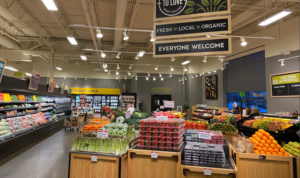
When you walk into Lakewinds, the first thing you see is the beautiful, bright, colorful, fresh produce. It’s carefully stacked by hand each day. But beyond its visual appeal, what makes organic produce at Lakewinds different from other stores?
The co-op focuses on providing you with organic produce grown locally as much as possible and as the Midwest climate will allow. The vast majority of the local produce farmers we partner with grow fruit and vegetables on small, organic family farms and follow sustainable practices that are better for people and the environment. But there are more considerations involved in the careful sourcing and high standards of produce at the co-op.
Support Small-Scale, Local Farmers
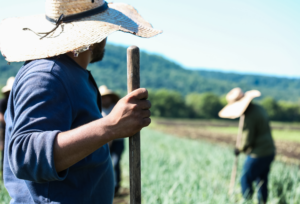
You’ll find locally grown food throughout the store, every day, throughout the year. When it comes to organic produce, late summer and early fall are prime harvest season, with numerous varieties of locally grown, organic produce available.
When you buy food from local farmers, you’re helping protect our vital local food system. Our community needs sustainable local farmers to succeed, so they can continue to grow the food we eat. Without them, we’d have to rely solely on food grown far away and on complicated, sometimes vulnerable supply chains.
Small-scale, sustainable family farms grow food for people in eco-friendly ways, including by:
- Avoiding pesticides so pollinators thrive and there’s minimal (to no) residue on the vegetables you eat.
- Using natural fertilizer to improve the microbiome of the soil and using just the amount needed, in order to reduce runoff into waterways and rivers.
- Growing different types of food and rotating crops (instead of monocropping), which helps the biodiversity of the earth.
- Using beneficial insects for pest control and using other eco-friendly tools and processes instead of chemicals.
- Following low-till (or even no-till) practices to reduce carbon footprints and improve soil health.
Support Organic and Sustainable Methods
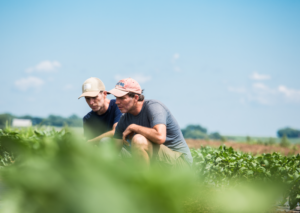
Over the course of the year, the produce department is, on average, 94% organic. The other 6% includes local produce that’s grown hydroponically and aquaponically; local apples that are grown using integrated pest management (IPM), which means that growers use beneficial insects and other strategies and only use chemicals as a last resort and the least amount possible; and other sustainably grown produce. The focus is first on produce that’s organic, locally grown, and of the highest quality.
Enjoy Local Produce Year Round
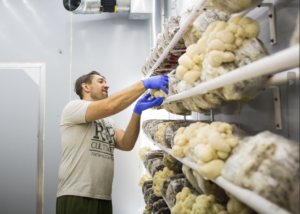
Supporting local organic farmers who grow food in dirt is ideal. But the Midwest growing season is short. Even in the middle of winter, you can find locally grown mushrooms from R&R and Northwood Mushrooms, aquaponically grown greens like those from Superior Fresh, and hydroponic tomatoes, herbs, and other greens.
When you buy locally grown greens in the colder months, it helps reduce shipping miles, compared to greens that come from California or other locations. And when you purchase locally grown food, more of each dollar stays in the local economy where it can support other businesses, too.
Know Who Grows Your Food
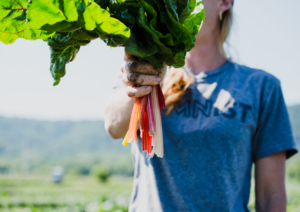
You have a connection to the people who grow your food when you support local, organic produce farmers. You may subscribe to a CSA. You can visit your local farmers market. You can go on the Co-op Farm Tour each summer. And you can feel good knowing that the team at the co-op knows the farmers, too.
The team at the co-op not only talks frequently with local farmers, they also visit farms and see sustainable farming practices firsthand. Co-op staff visit farms to learn about growing practices and connect with the farmers who bring you your food. Part of caring for community, which is a tenet of co-ops, is connecting with farmers and makers to bring the best local food to your shopping cart and kitchen.
Look for the Real Organic Project
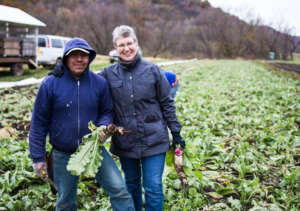
Some of our local produce farmers have taken the extra step to be certified by the Real Organic Project. In addition to being certified organic by the USDA, these farmers grow food in soil (aquaponics and hydroponics don’t qualify) and follow other strict criteria, including taking steps to improve the health of soil, paying workers fair wages, providing a safe and healthy working environment, and more.
Read more about the Real Organic Project in an interview with director (and former Lakewinds board of directors member) Ariel Pressman.
When you walk into the co-op and see the bountiful produce, carefully stacked, know that it’s also been meticulously sourced. It’s as local as can be, as organic as can be, and as fresh and delicious as can be — for your peace of mind and for your taste buds, too.
Meet some of the local produce farmers we partner with and whose delicious produce you enjoy!
